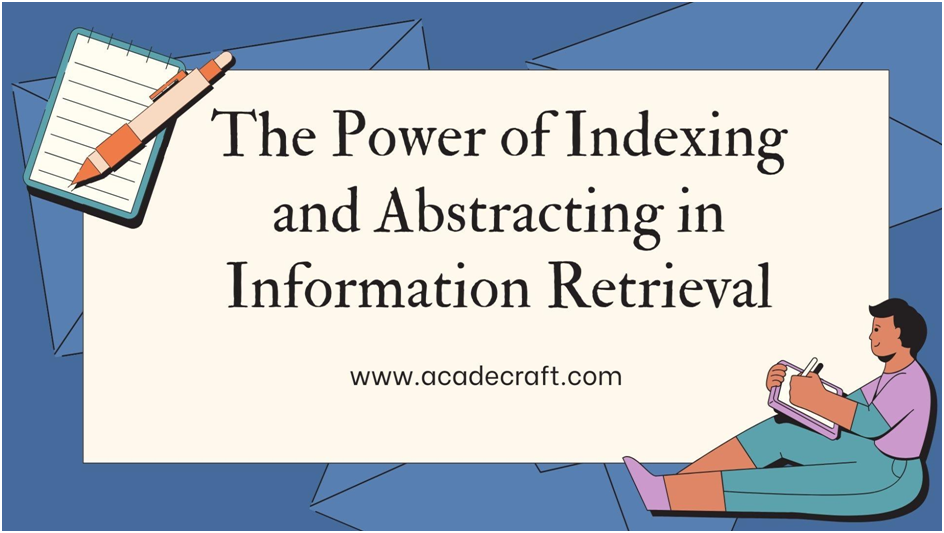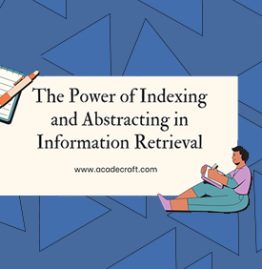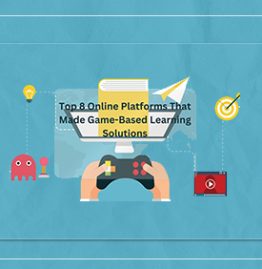Huge information and data in today’s digital world can be overwhelming. The need for effective retrieval of information has never been greater. Millions of documents, articles, and data points scattered across multiple platforms and databases push this further. What could be an effective way to get such immersive content? This is where the indexing and abstracting services come in handy. It’s full of valuable tools that make it easy to find, organize, and extract key information from large amounts of data.
In this article, we are about to discuss the power of indexing and abstracting, effective services along with some indexing and abstracting services examples.
How to Index and Abstract For Information Retrieval
Information retrieval and access is based on two interrelated processes: indexing and abstraction.
Indexing is the process of scanning and annotating, or keywords, documents to create a structured structure that facilitates better retrieval while abstraction is the process of compiling longer texts into shorter texts or summaries a mouth that conveys important information without forcing the reader to read it all in writing
Together, these tools help users access key information quickly and effectively, saving time and effort.
The Roles Of Indexing And Abstracting Services
Services for indexing and abstracting are useful in many ways such as academic discourse, data retrieval, and more. Lets discuss an outline of their roles and value:
● Data Filtering
Indexing and abstracting services are crucial in helping users to sort out vast information by dividing documents into groups like title, author, date of publication or keywords. This type of categorization enables users to rapidly limit their searches to pertinent materials.
Abstracting services are involved in exchanging texts and this is done through providing summaries. By abstracting titles, users can quickly evaluate the suitability of a document from its few words without having to read the whole article; this is how it saves time for them in accessing relevant pieces.
● Information Retrieval
The indexing function facilitates information retrieval by enabling users to search for documents based on specific criteria. Users can search indexes by keywords, subject headings, or other metadata to better find relevant documents.
Abstract functions enhance information retrieval by providing concise but informative summaries that help users determine the importance and relevance of documents to their information needs.
In a nutshell, Indexing and abstracting services streamline the retrieval process, allowing users to quickly and efficiently access relevant information.
● Standards and Consistency
Indexing and abstracting services follow standards and guidelines for indexing and abstracting documents. This standard ensures consistency in the way information is organized, indexed, and represented.
Thus, it makes it easier for you to navigate and interpret search results in databases or information systems.
● Value-added Services
In addition to indexing and abstraction for documents, some indexing and abstraction services provide value-added features such as citation analysis, document linking, and indexing of non-textual information (e.g., images, multimedia).
The services further enhance the efficiency and effectiveness of the information retrieval process.
The Revolutionary Effect
The introduction of indexing and abstracting services has completely changed how people may access and use information. Their transforming influence is evident in multiple fields as follows:
● Academic research
Abstracting and indexing services are becoming essential resources. It helps scholars looking to fill in knowledge gaps and examine the body of existing literature. These services speed up research and encourage creativity and teamwork by simplifying the discovery process.
● Education
These services offers educators and students to access a vast amount of relevant scholarly informations. Enriching the learning process, these services make it easier to retrieve high-quality information, whether they are doing literature reviews or creating course materials.
● Professionals
Professionals from multiple fields rely on indexing and abstraction services to keep track of developments in their disciplines. It helps professionals make calculated decisions and improve their work.
From technicians exploring mindfulness to health professionals, it helps all to receive the most recent data and information of their relevance.
Indexing and Abstracting Services Examples
● PubMed
Developed by the National Center for Biotechnology Information (NCBI), PubMed provides users with access to millions of citations from research, clinical studies, and research publications in the biotechnology literature.
PubMed has been extensively using the indexing and abstracting services for their biomedical literature. It helps them organizes papers using restricted vocabulary phrases, including Medical Subject Headings (MeSH).
● Scopus
Elsevier created Scopus, an indexing tool for academic journals, conference proceedings, and patents. It gives users access to a huge library of research material. To help with effective information retrieval and study evaluation, the site provides abstracts, citation analysis tools, and advanced search capabilities.
Science, technology, health, the social sciences, and the arts and humanities are just a few of the fields covered by this extensive abstract and citation database.
● Google Scholar
Google Scholar is a service which, though not traditional in nature, plays a vital role in academic information retrieval. It indexes from sources such as academic publishers, institutional repositories, professional groups and other scholarly literature providers.
Using Google Scholar one can find academic papers, theses, patents or case law on any topic. However, even if Google Scholar’s indexing algorithms are less precise than those of specialized databases it still serves as a user-friendly tool for finding academic stuff easily.
● Library of Congress Catalog
The Library of Congress Catalog is also a popular example of an indexing and abstracting service. It offers services for library resources, such as books, journals, maps, and audio visual materials.
The catalog uses standardized subject headings like the Library of Congress Subject Headings (LCSH) to index and arrange its holdings. It allows users to search content by subject matter, genre or format among other considerations.
Finally, each item in the catalog has a few sentences blurb and bibliographic record which makes it easier for patrons to find items in library holdings.
Evaluating Indexing and Abstracting Efficiency
When we talk about the performance of indexing and abstracting, it is key to know that there is no one way of index an information object. The best way to measure the efficacy is to use tools like recall and precision. Time it takes to run the program is also a factor to consider.
It entails evaluating retrieval efficacy and making sure relevant research are quickly recovered. The indexing system’s efficiency is determined by its capacity to arrange data logically and facilitate users’ efficient retrieval of needed resources.
Also, it is important to take user feedback and satisfaction to improve indexing procedures. Maintaining optimal efficiency in indexing and abstracting services requires constant monitoring and adaptation to evolving information needs and technology improvements.
Conclusion
Indexing and abstracting services are essential resources for information retrieval in an era of abundant information. Through the systematic arrangement, classification, and synthesis of substantial volumes of data, these services enable users to proficiently navigate the intricate terrain of information.
Indexing and abstracting functions are necessary to enhance the availability of information for scholarly study, industry application, or personal research. These functions are critical to improving information discovery and transmission, and will increase in importance as technology improves, enabling consumers to fully harness the power of information.
Essentially, indexing and abstracting services are the perfect example of how human understanding and technological innovation may work together to unlock knowledge hidden within an ever-expanding digital cosmos.


































































